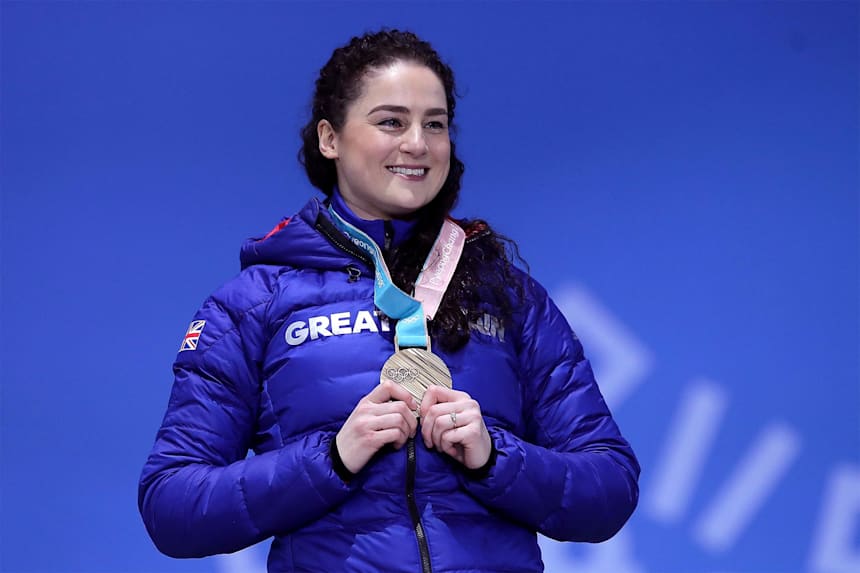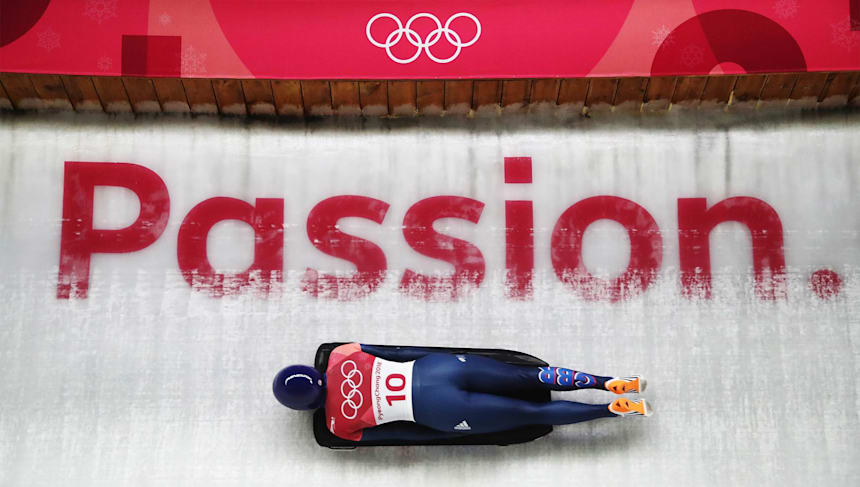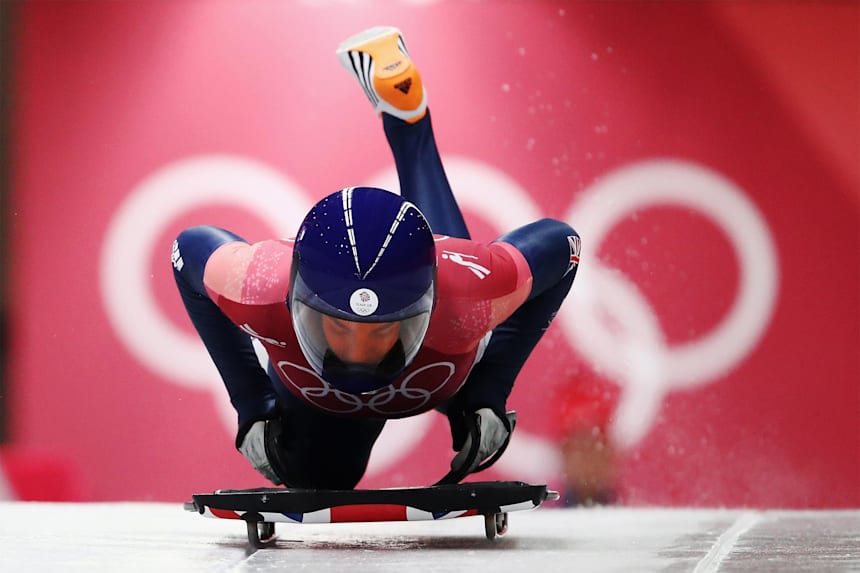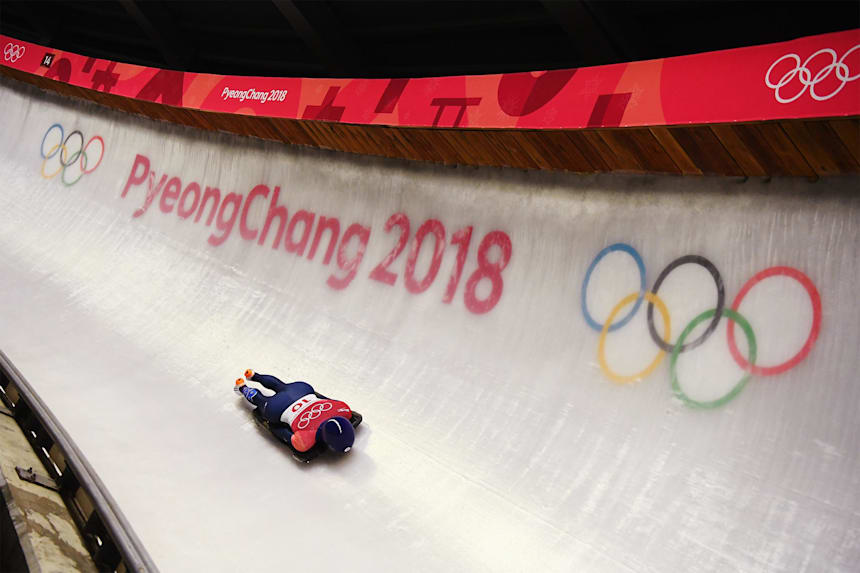PyeongChang Powered: Deas primed to continue Britain’s remarkable skeleton run
Two years after transforming her career by grabbing bronze in the women’s skeleton at PyeongChang 2018, Great Britain’s Laura Deas is a different athlete with different objectives. But while she is fully focused on going two steps higher on the podium in Beijing in 2022, she never underestimates the power of that magical moment in the Republic of Korea.
“There is life before that day and life after that day. They are two different things,” Deas said mid-way through the 2019/20 season. “It has changed my life in lots of ways.”
Intriguingly, the one time the significance of winning an Olympic medal diminishes is when Deas takes to the track.
“The sporting environment I am in is a fast-moving one, and it would be unhealthy to a certain extent for me to try and feed off that [bronze medal] constantly. The sport is moving forward and I have to move forward as well,” the British athlete stressed.
“I try and get a balance of taking loads of confidence from it and reliving the good bits but not leaning back and relying on it too much.”
Laura Deas gets the Bronze Medal in the Women's competition | Skeleton
It is a point which is given added significance by the fact that Deas has recently changed coaches, moving under the stewardship of two renowned trainers, Canadian Charles Wlodarczak and Latvian Mareks Mezencevs.
“It's going really well, moving in a really positive direction. It's good to work with different people,” said Deas, who along with the rest of the British squad started work with Wlodarczak and Mezencevs ahead of the current season. “You learn to look at things in a different way, a perspective you might not have thought of before.”

While she is not overwhelmed by her results so far – the 31-year-old has yet to finish higher than 10th in a World Cup race this season – she is confident the team is moving in the right direction.
“We are still getting to know each other,” she said of her two new bosses. “We are still at the stage of learning how the other person sees sliding, simple things like the type of language you use around the technical stuff. It’s different for everyone.”
This focus on minute detail is part of the reason Deas remains fascinated by the sport.

“Obviously it’s very physical but it’s also very cerebral,” she explained. “There are lots of layers to it. To start with, we are at a different track each week, and every track has its own character which you are trying to work out. Naturally you will be better suited to some rather than others.
“You are moving at 80 mph [130 kph] and you are constantly trying to make calculations and decisions about what has just happened, what’s happening in front of you, and [you need to] stay relaxed. It’s a sport [in] which [it] really shows up if there are things you are still trying to iron out – it exposes everything. And that’s one of the reasons why, when everything goes well, it’s so satisfying and so much fun. It really tests you in every way.”
Given all this, it is no surprise that the build-up to Deas’ moment in the Olympic sun was tough and long. A lone World Cup victory at the beginning of the 2015/16 season, accompanied by four further podium places stretched over five years, does not tell the story of the unstinting dedication required.
WHAT A DAY 🥉 https://t.co/JnyQcRnWNz
— Laura Deas OLY (@skeletonlaura) February 18, 2018
The woman from Wales has, however, always had one advantage on her side. Sport-obsessed as a child, she was a fledgling international eventer before swapping her horse for a sled, and that initial sporting career has helped her on the ice far more than you might expect.
“On a practical level, a lot of the skills are the same,” Deas said. “You’ve got to have a really good feel for both. You’ve got to be able to plan ahead, remember a course, think about what’s going on underneath you at the same time as thinking about what’s just happened and what’s happening next”.

“Horses taught me a lot about keeping a positive outlook on life. I do miss that partnership that you have when you have a good horse and you are competing together, but you have that to a certain extent with your sled because it’s a very personal thing to you. Actually, the first sled I was given by the coach I named after one of my event horses.”
As well as her previous sporting career, Deas also has close friend and double Olympic champion Lizzy Yarnold to rely on. The pair have been inseparable for years, even serving as each other’s bridesmaids in 2018 and 2019, and although Yarnold retired after retaining her Olympic title in PyeongChang, she remains a constant presence for Deas.
“Quite often, if I am watching an old race back and I want to see how things should be done, nine times out of 10 if you watch Lizzy’s run that is going to be pretty close to what you want to be doing. In that sense she still helps me a lot,” Deas said. “She’s still very much the benchmark for how to make things look good and how to slide fast.”

Deas missed the individual event at the 2019 World Championships after injuring herself in the team competition, but she has one eye on the 2020 edition and another on the Olympic Winter Games Beijing 2022. Once there, she will carry the pressure of knowing that British athletes have claimed at least one medal at every Olympic women’s skeleton event since its debut in 2002 and have won the past three golds.
Not that she seems too bothered.
“We are almost halfway through the Olympic cycle already,” Deas said excitedly. “I remember in the last Olympic cycle as soon as Rio [2016] had been and gone there was suddenly this realisation ‘we’re next’. I can’t wait.”